A lot of amazing authors contribute to Powell's Blog, and not all of them get the attention they deserve. Here's a look back at some of the most thought-provoking author posts to appear on Powells.com this year — along with four interviews that you really shouldn't miss.
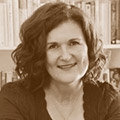
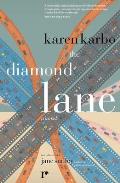 The World of Publishing: 1991 vs. 2014
The World of Publishing: 1991 vs. 2014
by Karen Karbo
The author of The Diamond Lane and 13 other works itemizes the responsibilities writers must now shoulder to promote their books.
"The Diamond Lane, published in May 1991, was my second novel, and what is most striking about the difference between the publishing process 23 years ago and now is not that the book was written on a Kaypro, Xeroxed at Kinko's, and sent overnight in a FedEx box to G. P. Putnam's Sons, but that after the manuscript was accepted and given a pub date, I asked my esteemed editor, 'What should I do now?' and she said, 'Just write the next one.'" (Read the full post)

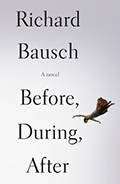 Why Literature Can Save Us
Why Literature Can Save Us
by Richard Bausch
Bausch — author of 20 books including Before, During, After — walks us through the danger of abstractions and the redemptive power of literature.
"There is a form of imaginative genius present in every act of mercy. I believe that if the person who has the power to destroy another life can be given the ability, the gift, of seeing the reality of that life beyond abstraction, of making the leap of imagination that gives forth a sense of the other completely, free of concept, then killing can stop and peace can begin." (Read the full post)

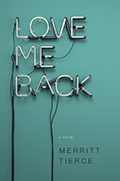 Has My Husband Read It?
Has My Husband Read It?
by Merritt Tierce
Merritt Tierce, a National Book Foundation 5 Under 35 honoree, is the author of Love Me Back. Here she writes about a question she gets asked all too frequently.
"I suppose those who have posed this question to me could be making the most innocent of inquiries; after all, it's a normal enough thing to wonder about someone who makes any kind of art and has a spouse or partner. But the question still grates, because maybe what they mean is something more like, 'Is your husband really OK with the fact that you wrote a book about someone who resembles you in several significant ways, and that person has sex with a lot of different people...?'" (Read the full post)

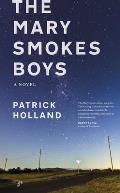 Silent Plains
Silent Plains
by Patrick Holland
Patrick Holland, author of The Mary Smokes Boys, explains how he incorporated the East Asian idea of generative silence in his novel.
"Silence, you might say, was bred into my being. The town in which I grew up in southwestern Queensland sits upon a vast and ancient flat plain. The plain is cut by an ephemeral water course called the Bungil Creek, whose headwaters are in a pocket of — very moderate — 'high' country, roughly 70 kilometers north of town and which the vast majority of maps do not even see fit to name." (Read the full post)

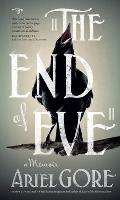 Bringing Up the Dead
Bringing Up the Dead
by Ariel Gore
The author of the memoir The End of Eve addresses her belittling mother, a recurring nightmare, and the decision she made to let the truth come out in all its ugliness.
"My mother was already dead when I started writing The End of Eve, but she'd only been dead a couple of weeks. From a mental health perspective, I probably should have waited longer. Maybe time would have staved off the nightmares. But from an artistic perspective, I knew I couldn't wait." (Read the full post)

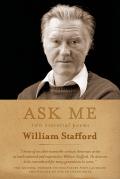 Four Elements of a Daily Writing Page in William Stafford's Practice
Four Elements of a Daily Writing Page in William Stafford's Practice
by Kim Stafford
The poet, author, and editor of Ask Me: 100 Essential Poems of William Stafford details the daily writing ritual of his esteemed father.
"This year we celebrate the centennial of William Stafford's birth — in Hutchinson, Kansas, 1914. He started in the Midwest but published 59 of his 60 books in Oregon (not to mention the dozen published since his passing in 1993). When people would ask him, 'Bill, when is your next book coming out?' he would often answer, 'Which one?'
How did he do that? Well, the answer is very simple and lavishly inviting..." (Read the full post)

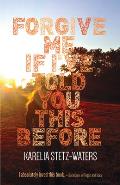 The Hot Sex Tip Cosmo Won't Tell You
The Hot Sex Tip Cosmo Won't Tell You
by Karelia Stetz-Waters
Karelia Stetz-Waters discusses Forgive Me If I've Told You This Before, her semi-autobiographical young adult novel, and explains her approach to depicting sex in fiction.
"Sex-scene opponents argue that subtlety is always best. If we're talking mighty swords and womanly heat, I agree. I don't care for detailed anatomical descriptions either. If you need a pamphlet on finding the clitoris, I could write it, but that's not a work of fiction. However, there is a kind of sex scene that is essential to great fiction..." (Read the full post)

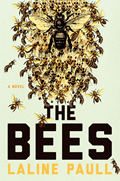 Umwelt
Umwelt
by Laline Paull
Debut author Laline Paull highlights an evocative German word that helped inform her approach to the dystopian novel The Bees.
"Back in England I looked up umwelt again, and decided to use it as a tool to engage more deeply with my worker-bee protagonist, Flora 717. I had already done quite a lot of reading (though the wealth of bee literature means I have but skimmed the surface), and I had visited hives, bothered biologists, tasted many honeys, and watched bees wherever I could. With the idea of umwelt in mind, I would engage in a more intense observation." (Read the full post)

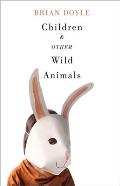 The Rude Burl of Our Masks
The Rude Burl of Our Masks
by Brian Doyle
Local writer Brian Doyle, author of Children and Other Wild Animals and four other works, shares a retrospective piece about a child oblivious to his mother's physical suffering.
"I knocked on the door of the doctor's office and no one answered and I knocked again and no one answered and I said something unforgivably rude for which I still feel ashamed of myself even today although no one heard me in the deep brown dusk near the woods by the highway." (Read the full post)
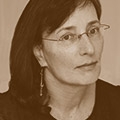
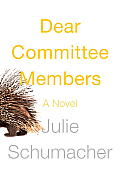 Dear Professor Fitger
Dear Professor Fitger
by Julie Schumacher
The author of Dear Committee Members writes a letter to the disgruntled narrator of her novel.
"Did I immediately love you? Identify with you? Clandestinely, and from a distance, yes. Though you are male and divorced and prone to outbursts and I am not, we have several important things in common." (Read the full post)
÷ ÷ ÷
Interviews
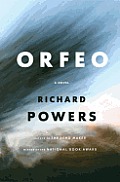
 Richard Powers: The Powells.com Interview
Richard Powers: The Powells.com Interview
by Jill Owens
The National Book Award winner reflects on his latest novel, Orfeo; composing and listening to music; and bio-artist Steve Kurtz.
"There are moments when Els is reflecting on the real crisis in music right now, which is that it's superabundant. When all of us can listen to every piece of music that was ever written, at any time, from anywhere that we want, how can we hear anything?
What happens is we cease becoming adventurers and we cease becoming participants and subjects in this grand experiment of art, and we simply become consumers and really good commodity experts. When we have the entire gamut for our consumption, we just go to those things that we like the easiest. And that's the problem. It's hard to listen all the way through a three-minute song when we know that with the flick of a finger, we can pull up something that might be slightly better for our current mood." (Read the full post)

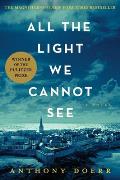 Anthony Doerr: The Powells.com Interview
Anthony Doerr: The Powells.com Interview
by Jill Owens
The award-winning author discusses his novel All the Light We Cannot See, cursed jewels, German propaganda, and more.
"I don't believe in reincarnation. I feel like we're here for such an appallingly brief period of time. I believe we each get this one trip, and if we're really, really fortunate, maybe we get 70 or 80 years on Earth.
There are so many things to be dazzled by, whether it's the trams in Portland and how they operate or the shelves at Powell's, the fact that you can read about Byzantium, and then go read Calvin and Hobbes one floor away. Or the lives of little shrimp, or the little gnats that were around my book up in the mountains of Hawaii last night that live less than a day. All these things exist, and I want to have time to learn about all of that.
If I'm amazed and I feel a sense of wonder about something, I usually try to give that to a character and have that character share that amazement. That enthusiasm for the world hopefully, in some small way, transfers to the reader." (Read the full post)
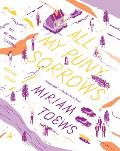
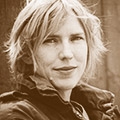 Miriam Toews: The Powells.com Interview
Miriam Toews: The Powells.com Interview
by Jill Owens
Canadian writer Miriam Toews opens up about her deeply personal novel All My Puny Sorrows.
"All of my life I only had one sibling. My sister, Marjorie, was six years older than me. I grew up in her shadow. She was larger than life. She was very articulate and eloquent and elegant and well spoken, very fun and glamorous. She did things that I dreamt of doing one day. Like reading — that was at an early age [laughter]. Then traveling, going to university, having boyfriends. So I was always examining her from a bit of a distance.
But there was also something else about her. There was something that I couldn't quite catch, or connect with. That so intrigued me. There was a mystery about her. I think that was, in retrospect, the beginning of her suffering, of her despair, of her depression, of her mental illness, whatever you want to call it. That was the place that I couldn't go to and was so compelling to me, so fraught and so dark." (Read the full post)
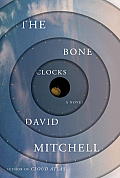
 David Mitchell: The Powells.com Interview
David Mitchell: The Powells.com Interview
by Jill Owens
The renowned author of Cloud Atlas talks about his new book, The Bone Clocks; his tendency toward interconnected fiction; and the nature of time.
"I have recently noticed the blindingly obvious: I make novels out of novellas. It's an odd way to go about it, but my optimum form is the novella, this very unfashionable 70-120 pages. I'm not a natural short story writer. My books are big, but they're big because I build them out of novellas. It's a bit weird. It's a bit oddball. But it's how I seem to do it. Everything has a price; everything has a payback. The price is you have to link those novellas and make them work as a novel, and do it thematically or through the same characters or even, like in Cloud Atlas, by having the novellas being artifacts inside their successors." (Read the full post)